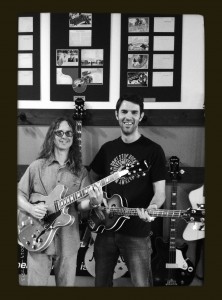There are a couple of main questions / comments that come up from time to time, in regards to the group guitar program.
Here is our best effort to give you more information about these.
“My child loves the group guitar, but i cannot get them to practice as much as I would like them to.”
This is a common question that comes up during almost every session, by at least a couple of families. The starting point is to realize that what you are going through, trying to get your rocker to practice or hoping they will just do it without any prompting, is completely normal. Unlike the days when we all took music lessons, there are far more distractions for kids, minecraft anyone?
The group program is designed to engage and inspire the rockers in a variety of ways, so even if they don’t become the next Jimi Hendrix, (which will require hours of weekly practice at home) they have a fantastic foundation in music and guitar that will give them universal tools for life.
It is not uncommon at all for rockers in 101 – 301 and even later to only practice at home when asked by their parents. We usually see this ramped up when we get closer to the show date as we instill a sense of being part of the band and others relying on them to rock.
Many of the fantastic guitar players now in the DSR Hall of Fame that went through 3 years of group guitar and beyond, and we’re in an identical position early in their group program!!
If your rocker is not up to pace with the lesson and what we are expecting them to know, we will certainly let you know. If you haven’t heard from us it means your Rocker is keeping pace, regardless of their at home practice schedule.
What to do?
These techniques do work and we are happy to share them with you.
Set your own expectations: It is true, that if someone spends 45-60 minutes each week practicing at home, they will be more advanced than only practicing for 15 minutes, however, becoming a fantastic guitar player is only part of what we are trying to accomplish.
Designated short rock sessions: 10-15 minutes 2 to 4 days a week will keep a rocker on track. Try dropping the “practice” word and talk about Rockin’
Rule of three: Forget the time limit. Ask your rocker to play the section, piece or technique for you 3 times in a row correctly (if they make major mistakes they start again) You’d be surprised how efficient a kid can become.
Make it fun: It might not seem to make sense, being rewarded for doing something that is already awesome, but we have found that for the younger kids and those in the first few sessions really seem to respond to a small reward for hard work.
Use the review videos: The review videos contain the main parts of each weeks lesson and are about 10 minutes long. If a rocker “doesn’t know what i’m supposed to be doing” these video’s will answer those questions.
Ask us to have a chat: If none of the above tried and trusted techniques work, just let us know. Often times a quick word from their instructor, explaining the reasons for rockin; and being part of the group is enough to steer them in the right direction.
In addition.
Sometimes we get a class that has no distractions and the full 50 minutes can be dedicated to learning the parts of the song during the class. It is often in these classes that we hear from parents that their rocker hasn’t been practicing as much as they had in the past or as much as the parents would want them too.
Each week the group has musical goals to be met and some weeks these goals are more rigorous than others. From time to time we concentrate on reviewing to firm up ideas from throughout the semester. It is not uncommon for students during review weeks to practice less because they have achieved their goals during class. We will always be the first to let you know when we notice a student is having difficulty or when they haven’t practiced enough to accomplish their musical goals for the class. More often than not this simple nudge is enough to bring a rocker back to the classroom pace.
“My child is really shy, i don’t think they would like the group dynamic.”
Don’t Stop Rockin’ has been designed over the past 4 years to provide much more than simply learning the mechanics of the guitar. Students learn the fundamentals of music, the cultural and historic impact of rock and roll and how to work together as a group. With input from Rob’s sister, who is a pediatric psychologist at Stanford University, we try very hard to use a shared band vocabulary and create an environment that empowers each rocker well beyond the classroom.
It is common for us to hear from parents that their child has turned a corner socially and or has reached a new level of maturity. Without question the large degree of our students grow in confidence. By providing a genuine acceptance of each individual personality and recognizing the importance of the individual as a member of the band we work to create a classroom designed to allow each rocker to be themselves while accepting of the rest of the band.
Here’s just a couple of the comments we’ve had: “You don’t know how much you and Rob have done in raising his self esteem and/or opinion of himself. Thank you again for all you do.” and “This program is amazing. I enjoyed listening to him practice and enjoyed watching his confidence grow not only in his musical ability but overall”















